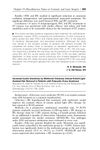Nanotechnology shows promise for better hair loss treatments but needs more research for safety and effectiveness.

Androgen suppression therapy (AST) doesn't significantly lower bladder cancer risk, but using finasteride, a type of AST, might reduce it. AST decreases recurrence-free survival but doesn't affect overall survival or progression-free survival. More research is needed to understand AST's benefits.

Androgen suppression therapy (AST) doesn't significantly lower bladder cancer risk, but using finasteride, a type of AST, might decrease the risk. AST also lessens the chance of cancer coming back but doesn't really affect survival rates. More research is needed to understand AST's benefits for different bladder cancers.
 October 2020 in “Проблемы эндокринологии”
October 2020 in “Проблемы эндокринологии” Men with higher androgen levels may have severe COVID-19 symptoms, but those on antiandrogen therapy are less likely to contract the virus and have milder symptoms. Anti-androgen drugs could potentially treat COVID-19, but more research is needed.
 23 citations,
January 2016 in “Transgender health”
23 citations,
January 2016 in “Transgender health” Hormone therapy with estradiol and spironolactone can regrow scalp hair in transgender women by lowering testosterone to female levels.
15 citations,
March 2015 in “PloS one” Scientists restored fertility in male mice lacking a key fertility gene by using a modified gene.
 12 citations,
March 2017 in “Journal of obstetrics and gynaecology Canada”
12 citations,
March 2017 in “Journal of obstetrics and gynaecology Canada” Testosterone therapy can modestly improve sexual function in menopausal women but should be used cautiously and is not recommended for routine measurement in sexual dysfunction or hirsutism.
 6 citations,
July 2013 in “Acta Clinica Belgica”
6 citations,
July 2013 in “Acta Clinica Belgica” The document concludes that combination therapy is most effective for treating excessive hair growth in women with idiopathic hirsutism, and more research is needed to understand the condition.
 5 citations,
June 2004 in “The Journal of The British Menopause Society”
5 citations,
June 2004 in “The Journal of The British Menopause Society” Testosterone therapy can improve sexual satisfaction and mood in surgically menopausal women when used with estrogen, but its long-term safety and effects on naturally menopausal and premenopausal women are unclear.
 3 citations,
July 2011 in “Expert Review of Dermatology”
3 citations,
July 2011 in “Expert Review of Dermatology” Effective treatments for excessive hair growth in women include creams, laser therapy, and medications, with the choice depending on individual needs and potential side effects.
 1 citations,
July 2015 in “Cambridge University Press eBooks”
1 citations,
July 2015 in “Cambridge University Press eBooks” Testosterone therapy can improve sexual function in women but long-term safety is unclear.
 December 2022 in “Jurnal Kesehatan Jompa”
December 2022 in “Jurnal Kesehatan Jompa” AAG causes hair loss in many people, with limited treatments like finasteride, minoxidil, light therapy, and hair transplants.
 January 2010 in “The Year book of dermatology”
January 2010 in “The Year book of dermatology” Taking metformin with intense pulsed light therapy improves hair removal for women with PCOS.
 January 2009 in “Elsevier eBooks”
January 2009 in “Elsevier eBooks” Some plant-based treatments may help with ovary function, insulin resistance, and excess male hormones in PCOS, but more research is needed to confirm their safety and effectiveness.
 37 citations,
May 2016 in “Deutsches Arzteblatt International”
37 citations,
May 2016 in “Deutsches Arzteblatt International” Hair loss requires customized treatments based on its various causes and types.
 17 citations,
December 2008 in “Dermatology”
17 citations,
December 2008 in “Dermatology” Taking metformin with intense-pulsed-light therapy improves hair removal for people with PCOS.
 75 citations,
February 2016 in “The Journal of Sexual Medicine”
75 citations,
February 2016 in “The Journal of Sexual Medicine” Androgens play a role in female sexual function, and testosterone therapy can help women with low sexual desire, but more research is needed on treatments and long-term safety.
 38 citations,
December 2009 in “Therapeutic Advances in Medical Oncology”
38 citations,
December 2009 in “Therapeutic Advances in Medical Oncology” The conclusion suggests that prostate cancer should be classified by castration status and that new therapies targeting androgen receptor signaling show promise.

New treatments for hair loss should target eight main causes and use specific plant compounds and peptides for better results.
 August 2022 in “Gene Reports”
August 2022 in “Gene Reports” New hair loss treatments could be improved by using combined biological markers.
 January 2006 in “Elsevier eBooks”
January 2006 in “Elsevier eBooks” Cats with Feline Symmetrical Alopecia can regrow hair with proper treatment based on the specific cause, including diet, medication, or stress management.
 12 citations,
October 2012 in “Dermatologic Clinics”
12 citations,
October 2012 in “Dermatologic Clinics” Low-Level Laser Therapy and other light treatments for hair growth lack strong evidence and need more research.
7 citations,
May 2014 in “Iranian Red Crescent medical journal” Laser hair removal is effective for hirsutism when combined with treatment for the underlying causes.

A new easy-to-use biosensor was made to detect androgen receptor mRNA, which could help diagnose related conditions quickly.
 49 citations,
January 2010 in “International Journal of Pediatric Endocrinology”
49 citations,
January 2010 in “International Journal of Pediatric Endocrinology” The document concludes that Nonclassic Congenital Adrenal Hyperplasia requires personalized treatment plans to manage symptoms and fertility, with glucocorticoids being a common therapy.
 42 citations,
April 2013 in “Steroids”
42 citations,
April 2013 in “Steroids” Non-classic congenital adrenal hyperplasia is a common disorder causing symptoms like acne and infertility, and it's managed based on symptoms, not just test results. Treatment can improve fertility and reduce miscarriage risk.
 27 citations,
May 2019 in “American Journal of Clinical Dermatology”
27 citations,
May 2019 in “American Journal of Clinical Dermatology” Antiandrogen therapy for hidradenitis suppurativa lacks strong evidence and needs more research.
3 citations,
March 2022 in “Research journal of pharmacy and technology” Parsley contains compounds that might be good for treating hair loss.
2 citations,
July 2022 in “BioMed Research International” Finasteride-loaded nanogels are effective, safe, and improve drug absorption through the skin.
 41 citations,
November 2003 in “Annals of the New York Academy of Sciences”
41 citations,
November 2003 in “Annals of the New York Academy of Sciences” Male hormones, or androgens, affect women's health in areas like mood and bone density, and hormone replacement therapy using antiandrogenic progestogens can improve mood disorders and alertness in menopausal women.
























